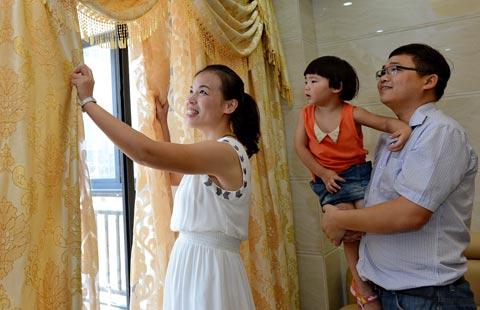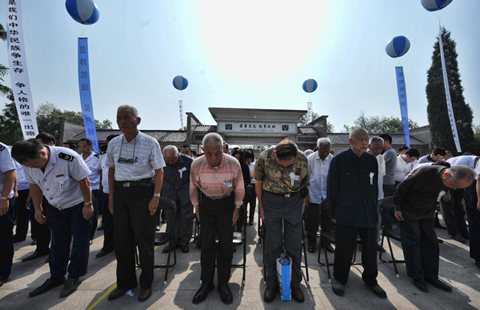New Oxford center will reflect new China
Updated: 2014-09-12 07:43
By Andrew Moody(China Daily Europe)
|
|||||||||||
One area in which it would like to expand over next few years is Chinese law, director says
Rana Mitter, director of the new Dickson Poon University of Oxford China Centre, believes China should now be seen as a plural noun rather than as a singular noun.
He hopes the center, now Europe's biggest and which opened on Sept 8, will reflect that modern diversity of the country.
"China is a whole diversity of different things in terms of culture, identity and direction," he says.
"Asking questions like 'Is China going to do x, y or z?' is so often wrong because there are so many different Chinas. Not just one."
Mitter, 45, was speaking in the lobby of the Regent Hotel in central Beijing. He was on a trip to the Far East, which also took in a visit to Singapore, just before returning to the UK for the launch.
He believes one of the roles of the 21-million-pound ($33.7 million; 26.2 million euros) center - of which 10 million pounds was donated by Hong Kong billionaire Dickson Poon - on the grounds of St Hugh's College at Oxford, will be to make clear that China is very much a living place and not some static entity mired in its history.
"I hope our center will be at the forefront of breaking down and reinterpreting this idea that China, unlike any other country, is supposed to be a fixed and unchanging place. This is clearly not the case.
"There is so much nonsense written and spoken about China's past, in particular, by people who don't necessarily have an understanding of the complexity and richness of the way China has developed over time."
Mitter, unassuming despite rapidly emerging as one of the world's leading Sinologists, says the launch of the Oxford center comes at a "historic moment" - when there has never been a greater need for a better understanding of China since the expertise available in the field of Sinology lags behind the fast rise of the country.
"China has become tremendously important economically and geopolitically but the level of understanding about China in the world outside of China itself is still quite limited.
"China centers are becoming more common phenomena on different continents around the world, including Africa and South America, but there are only a small number of places that can provide that depth of interpretation and I think Oxford is one of that small group."
Mitter was in China for the Beijing International Book Fair to attend the launch of the Chinese edition of his highly acclaimed book China's War With Japan, 1937-45: The Struggle for Survival, which he had to fit in with last-minute preparations for the opening of the center.
"Directing the China center is a very full-on experience with the setting up of the new building and bringing all my colleagues and students together. I haven't been doing it all personally but I have had to make sure it was all happening and that all the boxes were ticked."
In addition to his academic role, Mitter is also a well-known broadcaster in the UK, presenting Night Waves, an arts program on BBC Radio 3, where he branches out well beyond Sinology to interview famous writers, artists, film directors and other leading figures.
The son of two university lecturers who came to the UK from West Bengal, India, in the early 1960s, he was good at languages at school but only stumbled into Chinese at Cambridge.
"I wish I could say I did it with a particular vision and decided to get in early but that wasn't the case. When I began to think about studying Chinese in the late 1980s, it was Japan that was rising and not China," he says.
After studying as a Kennedy scholar at Harvard as well as at Cambridge, where he went on to do a doctorate in modern Chinese history, he pursued an academic career, teaching at Oxford for nearly two decades.
The author of other books on China, A Bitter Revolution: China's Struggle With the Modern World and Modern China: A Very Short Introduction, he became director of the Oxford China center officially last year.
Mitter insists the center is building on Oxford's strong links with China that go back centuries.
The first Chinese books came to the university's Bodleian Library 400 years ago. At the end of the 17th century, Shen Fuzong, a Qing mandarin and the first recorded Chinese person to visit the UK, famously went to the library to catalogue the books.
"We have one of the very largest collections of Chinese books and materials in Europe. We are outdone in numbers by the Staatsbibliothek in Berlin, but their collection is the whole of Germany's and not that of a single academic institution."
He points out that although the China center is a modern institution, poring over dusty old Chinese scrolls would not be regarded as part of its past.
In fact, one of Oxford's most recent major academic breakthroughs was the rediscovery of the so-called Selden map, which had come into possession of the Bodleian in 1659 but had lain in a drawer for a couple of centuries.
"It has become tremendously important in present day debates about China. China has been perceived as a land power only but this map proved that in the Ming Dynasty (1368-1644) it was also a sizeable maritime power as well."
The new center - with its state-of-the-art language labs for Mandarin training, seminar rooms and theaters with bamboo growing in the courtyard - is designed to engage with China at a whole series of different levels, some of which will be new.
Students from a series of different disciplines will attend the center to do specific courses related to their main subject.
"They will come and do their Chinese history classes if they are studying history or a China-related course or they are doing political science. One area in which we would like to expand, ideally, over the next few years is Chinese law. There is a huge amount of interest in that right now."
Mitter says that as a European center, Oxford can offer a different approach to that of the many China centers in the United States.
"North America has a number of distinguished China centers but there is always a feeling that with the present-day relationship between China and America, which is cooperative sometimes and constrained at others, that it is a competitive relationship between two great powers. I think Europe can have a different conversation with China."
He also believes the way China is studied in the United States is different from its study in the UK and the rest of Europe.
"We at Oxford and Europe come from a Sinologist tradition that perhaps owes its origins to the 19th century, although no one is exactly clear. It is about looking at China as an integrated whole.
"The United States is more dominated by the discipline of political science so, for example, someone there would call themselves a political scientist specializing in China and not a Sinologist."
Mitter believes the future could be in the concept of "new Sinology", popularized by Mandarin-speaking former Australian prime minister Kevin Rudd.
"I heard him at a conference a couple of years ago. This is more about how the different bits of China fit together, such as history, literature and economics, which can't just be understood through social science tools."
Mitter is also keen to engage Oxford's Chinese students, the biggest foreign group after Americans at the university.
"Chinese Oxonians are absolutely going to be an essential part of the enterprise. We want to hold events and discussions at the center about things that matter to them about China such as the environment and current economic reforms."
Mitter hopes the center with its new building has the capacity to be a leading global center of learning about China in the years to come.
"I hope the establishment and opening of the China center will send out a beacon that Oxford is a place that takes China very seriously indeed."
andrewmoody@chinadaily.com.cn
|
Rana Mitter, director of the Dickson Poon University of Oxford China Centre, says it wants to reflect the modern diversity of China. Wang Jing / China Daily |
(China Daily European Weekly 09/12/2014 page8)
Today's Top News
Obama orders airstrikes in Syria for first time
Putin blames West for Ukraine crisis
Cameron ' would be heartbroken' if Scotland leaves Union
China restricts overseas TV
Nation capable of hitting growth targets, Li says
Chinese peacekeepers to support South Sudan
Russia lays responsibility for MH17 crash
Space station eyes cooperation with other countries
Hot Topics
Lunar probe , China growth forecasts, Emission rules get tougher, China seen through 'colored lens', International board,
Editor's Picks

|

|

|

|

|

|






